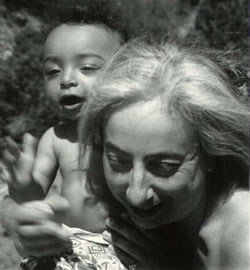Annie Dawid

|
Annie Dawid writes and photographs from her cabin at 9,100 feet in the Wet Mountain Valley of South-Central Colorado, where she lives with her son, Isaiah Max. And Darkness Was Under His Feet re-imagines the stories told to her by paternal relations at home and abroad. www.anniedawid.com |
From Transcript to Fiction |
 |
|
Growing up in New York, I heard from my father stories of his origins in Germany, his flight from the Nazis to China and subsequent emigration to the United States, where he would start the family that includes me, the youngest of three. In my thirties, after completing my first (non-autobiographical) book of fiction, I decided to get additional versions of the family story and, after several interviews with my father, did the same with all his first cousins, in France, Belgium and England. From these transcripts, DARKNESS was born. TRANSCRIPT: Interview with Heinz Dawid FICTION: Chapter 1, And Darkness Was Under His Feet: Stories of a Family (2008) These missing children of my grandfather’s family incited a book of linking short stories about the clan of Dawids, starting in 1900, but since I’m a fiction writer and not a historian, I needed to discover a way to navigate between competing versions of truth. One genre of family truths came from interviews I conducted during the early 1990s with six relatives, here and in Europe, who constituted the oldest generation of Dawids, whom I decided to call the Solomon family in honor of Salomon Dawid, my great uncle, who with his wife was killed in the camps along with four of his five children. The sole survivor, Clare, provided a crucial interview of the six, though I used none of her words in my book. From thirty hours of audiotapes, most of them in French, I had two interviews transcribed, one of which is excerpted here. Clare’s interview, upon re-reading, I deemed too monotonous for reproduction. Although my father, Heinz, had an extraordinary memory for details, the interview does not make for particularly interesting reading. My background in journalism helped me identify key quotes to supply facts I would need for my story. However, none of the verbatim conversation could be used: too stiff or dull or information-y. Instead of actual dialogue, all six interviews supplied me with tone, the way my characters used language and how personality shaped character, as manifested in their conversations with me. For example, Hans Solomon’s ambition and pride, noted by the reader in the chapter, "The German-Chinese Refugee: New York City, 1953," is innate to the boy my father had been, long before the circumstances of Hitler’s Germany sharpened his intensity. TRANSCRIPT: ANNIE: When you say, your mother was ambitious for you… When forty-year-old Hans/Heinz decides he will marry Doris, whom he has just met, despite her objections, his insistent confidence follows naturally from the child we have met in earlier chapters. At the end of the dinner date during which he has proposed, and Doris has fled, the reader finds him undaunted. FICTION: Hans calculates quickly: if they marry soon, their first child might even be born before the end of 1953. Tomorrow he will send another dozen roses. Hans leaves the waiter a good tip and catches sight of himself in the mirror as the maitre d' helps him with his coat: a confident man, smart in his new suit, a soon-to-be married man, nods sharply. Annie Dawid's stories chronicle a Jewish family's life across generations, countries, continents. This generous book [And Darkness Was Under His Feet] doesn’t seek to serve the writer's self, but by focusing on a particular family's experience, traces our communal story from the false security of the early twentieth century, through Holocaust and communism, up to the beginnings of our own day.—Lore Segal, author of Shakespeare's Kitchen: Stories | |
